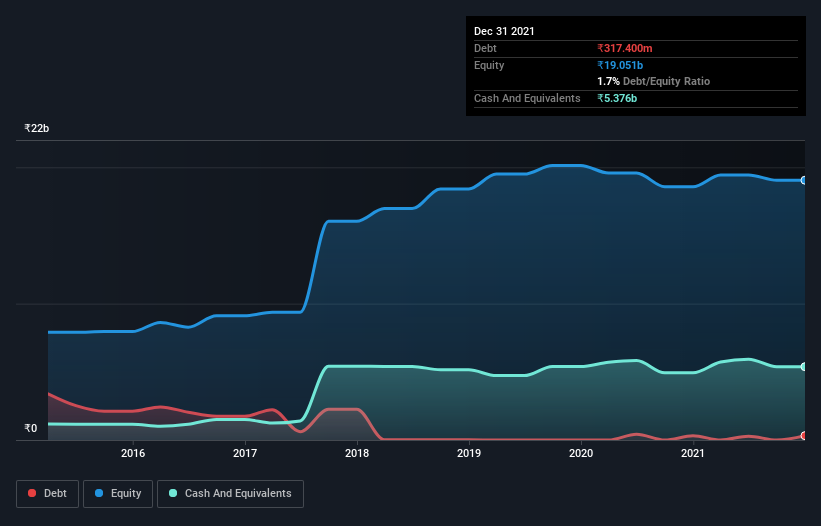Legendary fund manager Li Lu (who Charlie Munger backed) once said, 'The biggest investment risk is not the volatility of prices, but whether you will suffer a permanent loss of capital.' So it might be obvious that you need to consider debt, when you think about how risky any given stock is, because too much debt can sink a company. As with many other companies Delta Corp Limited (NSE:DELTACORP) makes use of debt. But the more important question is: how much risk is that debt creating?
When Is Debt A Problem?
Debt and other liabilities become risky for a business when it cannot easily fulfill those obligations, either with free cash flow or by raising capital at an attractive price. If things get really bad, the lenders can take control of the business. However, a more common (but still painful) scenario is that it has to raise new equity capital at a low price, thus permanently diluting shareholders. Of course, debt can be an important tool in businesses, particularly capital heavy businesses. The first step when considering a company's debt levels is to consider its cash and debt together.
View our latest analysis for Delta
How Much Debt Does Delta Carry?
The chart below, which you can click on for greater detail, shows that Delta had ₹317.4m in debt in September 2021; about the same as the year before. But it also has ₹5.38b in cash to offset that, meaning it has ₹5.06b net cash.

How Healthy Is Delta's Balance Sheet?
The latest balance sheet data shows that Delta had liabilities of ₹1.82b due within a year, and liabilities of ₹466.1m falling due after that. On the other hand, it had cash of ₹5.38b and ₹141.0m worth of receivables due within a year. So it can boast ₹3.23b more liquid assets than total liabilities.
This short term liquidity is a sign that Delta could probably pay off its debt with ease, as its balance sheet is far from stretched. Succinctly put, Delta boasts net cash, so it's fair to say it does not have a heavy debt load!
Although Delta made a loss at the EBIT level, last year, it was also good to see that it generated ₹919m in EBIT over the last twelve months. When analysing debt levels, the balance sheet is the obvious place to start. But it is Delta's earnings that will influence how the balance sheet holds up in the future. So when considering debt, it's definitely worth looking at the earnings trend. Click here for an interactive snapshot.
But our final consideration is also important, because a company cannot pay debt with paper profits; it needs cold hard cash. While Delta has net cash on its balance sheet, it's still worth taking a look at its ability to convert earnings before interest and tax (EBIT) to free cash flow, to help us understand how quickly it is building (or eroding) that cash balance. Over the most recent year, Delta recorded free cash flow worth 64% of its EBIT, which is around normal, given free cash flow excludes interest and tax. This free cash flow puts the company in a good position to pay down debt, when appropriate.
Summing up
While it is always sensible to investigate a company's debt, in this case Delta has ₹5.06b in net cash and a decent-looking balance sheet. So we don't think Delta's use of debt is risky. When analysing debt levels, the balance sheet is the obvious place to start. But ultimately, every company can contain risks that exist outside of the balance sheet. For example Delta has 3 warning signs (and 1 which is potentially serious) we think you should know about.
When all is said and done, sometimes its easier to focus on companies that don't even need debt. Readers can access a list of growth stocks with zero net debt 100% free, right now.
New: Manage All Your Stock Portfolios in One Place
We've created the ultimate portfolio companion for stock investors, and it's free.
• Connect an unlimited number of Portfolios and see your total in one currency
• Be alerted to new Warning Signs or Risks via email or mobile
• Track the Fair Value of your stocks
Have feedback on this article? Concerned about the content? Get in touch with us directly. Alternatively, email editorial-team (at) simplywallst.com.
This article by Simply Wall St is general in nature. We provide commentary based on historical data and analyst forecasts only using an unbiased methodology and our articles are not intended to be financial advice. It does not constitute a recommendation to buy or sell any stock, and does not take account of your objectives, or your financial situation. We aim to bring you long-term focused analysis driven by fundamental data. Note that our analysis may not factor in the latest price-sensitive company announcements or qualitative material. Simply Wall St has no position in any stocks mentioned.
About NSEI:DELTACORP
Delta
Operates in the gaming and entertainment, and hospitality businesses in India and internationally.
Flawless balance sheet with proven track record and pays a dividend.
Similar Companies
Market Insights
Community Narratives




